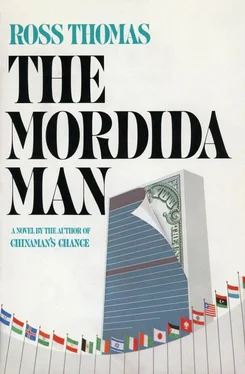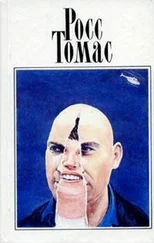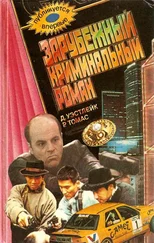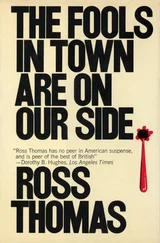“What about her?”
“I might have some use for her.”
“How?”
“I don’t know yet.”
Grimes lit a cigarette, blew some smoke out, and fanned it away. “That other thing.”
“You mean how I’m going to get a line on my Libyan?”
Grimes nodded.
“I’m going to see a guy I used to know in New York.”
“When you were with the UN?”
“Uh-huh. He owes me a favor. Maybe even two.”
“He British?”
“British.”
“You’re not going to...” Grimes let his question trail off.
Dunjee smiled. “I’ll be... oblique.”
“What’d this guy do?”
“At the UN?”
Grimes nodded again.
“He was a spy.”
The Pimlico street number in Dunjee’s small Leathersmith address book had been written there more than ten years before, and he was no longer at all sure that either it or the phone number he had tried several times that afternoon was still valid.
It was nearly three o’clock when he got out of the taxi in the rain, looked briefly up at the stern red brick example of 1913 architecture, hurried up its steps, and into the foyer. There was a double row of black buttons, and beside each button was a card with a name either written or printed on it. Dunjee noticed that most of the printed cards were engraved.
In the slot beside the button that belonged to flat three-E was an engraved card that read “Hugh Scullard,” except that Hugh had been crossed out with green ink and above it had been printed “Pauline.”
“Well, shit,” Dunjee said, a little surprised that he had said it aloud, and pressed the three-E button. When nothing happened, he pressed it again.
He was about to press it a third time when a woman’s voice said over the tinny foyer speaker, “What do you want?”
“It’s Chubb Dunjee, Pauline.”
“Who?”
“Chubb Dunjee.”
There was a brief silence until the woman’s voice said, “Do I owe you any money?”
“No.”
“Then come up.”
The buzzer rang and Dunjee went through the door. There was a small elevator with a glass-and-wrought-iron cage and a sign that read, “Lift Out of Order.” Dunjee walked up four flights and knocked on the door of three-E.
A deadbolt was turned back. Then a second one. The door opened the length of its three-inch chain. An eye peered out — red-rimmed, bloodshot, with a lump of sleep granules collected in one corner.
Dunjee nodded and smiled at the eye. “Pauline.”
“Well,” the woman said. “Congressman.”
The door closed, the chain was removed, and the door was thrown open. “Come in,” the woman said. “It’s a mess. And so am I.”
Dunjee went in, closed the door, looked around, and said, “What happened?”
“What didn’t?” the woman said.
Dunjee couldn’t decide whether Pauline Scullard was moving in or out. Cartons of books were stacked in one corner of the room almost to the ceiling. A gray cat sat half asleep on the highest carton. A rolled-up rug lay before the grate. Several paintings leaned against one wall. The furniture — a couch, some chairs, a few tables, some lamps — was huddled together at one end of the room near the tall windows, There were shades on the windows but no curtains. The shades were drawn.
Pauline Scullard made a vague motion at the room. “I just haven’t been able to cope — or something.”
Dunjee took off his raincoat, looked around for somewhere to put it, and decided on one of the book cartons. When he turned back, the woman was pouring liquor into a glass. She handed the glass to him and poured another one for herself.
“Do sit down,” she said. “Someplace. Any place.”
Dunjee chose the couch. The woman picked up some magazines from a chair, dropped them to the floor, and sat down, tugging at her miniskirt, locking her knees primly together, and pointing her feet to the left.
“I have proper dresses. Three, I think. I wear them on Tuesdays and Fridays. Visiting days.”
“Visiting days,” Dunjee said.
“Yes.”
“Where is he?”
“Hugh?”
“Hugh.”
“Hugh’s not here.”
“How long have you been back?”
“You mean here — in this place? You know, we were frightfully clever to buy this place, or rather the lease. That was back in ’sixty-eight. It had ninety-two years to run then. Now it has — what? Seventy-eight years?”
“Nine,” Dunjee said. “Seventy-nine.”
“That many? Well, that should be quite enough to see us out nicely, don’t you think?”
“What happened, Pauline?” Dunjee said patiently.
“You mean after New York?”
He nodded.
“Well, we went to Beirut and stayed there ever so long and after that we went to Berlin, but that didn’t work out very well so we came home and, well, here we are, Mopsy and me.”
“The cat.”
“That’s Mopsy up there on the books. Would you like a cigarette?” She reached into the pocket of the man’s gray cardigan that was nearly as long as her ancient miniskirt and produced a package of Senior Service. Dunjee took one, although he seldom smoked, and lit both cigarettes. Pauline Scullard inhaled deeply, finished her drink in three swallows, and smiled.
“How silly of me. An ashtray.” She rose and wandered around the room until she found what she was looking for. “Here,” she said and handed Dunjee an empty cat-food can. It hadn’t been washed.
“Tell me about it, Pauline.”
“Well, there’s really not much to tell. We came back from Berlin five months ago, six now, I suppose — here, to this place — and then Hugh went crackers, and so now I wear one of my three nice dresses when I visit him on Tuesdays and Fridays.” She smiled again, a strained, somewhat gray-toothed smile that Dunjee found a bit odd.
“He went crackers?”
“Yes, I’m afraid so. We had to tuck him away in this ever so nice looney bin out in St. John’s Wood. Visiting days, Tuesdays and Fridays. It’s private and terribly expensive and suddenly I’m very poor. Do you remember when I was rich? I mean, two thousand a year forever. Well, back then that was rich, wasn’t it? I mean, I was almost an heiress.”
“You’re broke?”
She stared at him for a moment, then nodded. Dunjee decided that she was still an extremely attractive woman, despite her odd dress and tear-swollen eyes. Her complexion was still creamy, and hugging her head was still that same curly cap of straw-colored hair; and if she would only start brushing her teeth and quit weeping she wouldn’t look much different from the way she had looked in New York a dozen years ago, although she must be thirty-seven now, perhaps even thirty-eight.
Dunjee sighed, took out his wallet, removed some hundred-dollar bills without counting them, and held them out to her. “Here,” he said. “Buy yourself something pretty.”
She looked at the money but didn’t touch it.
“It’s Monopoly money, Pauline. I didn’t work for it.”
“A loan?”
“Sure.”
She took the money. “It’ll be a while before I can—”
“I understand.”
“You’re very sweet, Chubb.”
“Tell me about Hugh.”
She picked up the Scotch bottle from the floor, poured some more into her glass, and held the bottle out toward Dunjee. He shook his head. She put the bottle back down on the floor.
“It started in Beirut,” she said. “Then it got really bad in Berlin, so they sent us home and pensioned him off. We lived like this for almost two months. He wouldn’t let me touch anything. He sat here in this chair by the window and looked out through the shade. He said he was waiting for them. When he slept, he slept on the couch. I brought him his meals on a tray over there by the window. He didn’t eat much. So finally I went to see them, you know, them, and they sent a doctor over, a shrink, I think, and two days later they came and got him and put him away in that private looney bin. It’s ever so nice and somehow I get dressed every Tuesday and Friday and actually go out there and see him. Paranoid-schizophrenic is what they say. I’m afraid it may be contagious.”
Читать дальше










